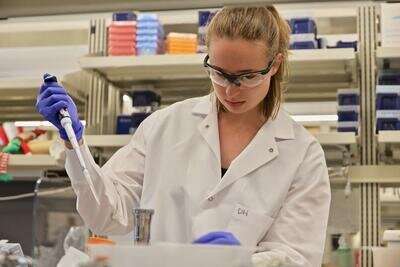Scientists deploy chemical tools to detect cancer-causing proteins

Scientists at Yale's Microbial Sciences Institute have taken an important step in our understanding of how infection alters proteins in a way that promotes tumor growth.
A hallmark of cancer-causing infections is oxidative stress, which occurs when our cells come into contact with oxygen-containing molecules called reactive oxygen species (or ROS) that can damage DNA and proteins inside cells.
Both types of damage occur in cancer, but far less is known about the proteins that are targeted by ROS because it is challenging to identify them.
The lab of Stavroula Hatzios, assistant professor in the departments of Molecular, Cellular and Developmental Biology and of Chemistry, has developed a chemical strategy for detecting such proteins in infected cells.
The findings, which appear in Nature Chemical Biology, are thought to be the first to implicate infection-induced protein damage in a tumor growth pathway.
So far, scientists have focused on DNA damage as the cause for mutations that lead to cancer. Far less is known about what happens during infection that alters a protein in a manner that promotes tumor growth.
Through a study of human gastric cells infected with the stomach cancer-causing bacterium Helicobacter pylori, the researchers identified a specific site on a host protein that is targeted by ROS and regulates tumor growth.
By applying a chemical proteomic strategy—essentially looking at a complete set of proteins in a given cell—in a live disease state, the findings shift how we think about what the molecular targets may be during infection.
The study has implications for other infections and casts new light on the mechanisms that may stimulate formation of tumors following chronic bacterial infections or changes in the gut microbiome that cause inflammation in some people but not others.
More information: Yekaterina Kovalyova et al, An infection-induced oxidation site regulates legumain processing and tumor growth, Nature Chemical Biology (2022). DOI: 10.1038/s41589-022-00992-x
Journal information: Nature Chemical Biology
Provided by Yale University



















